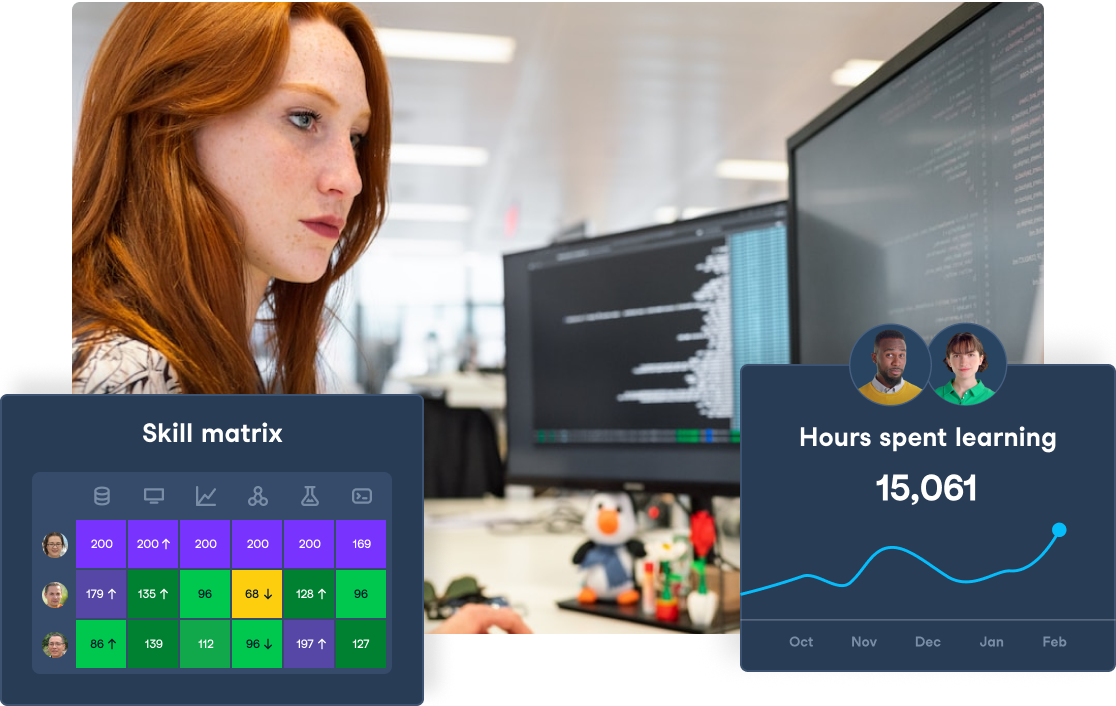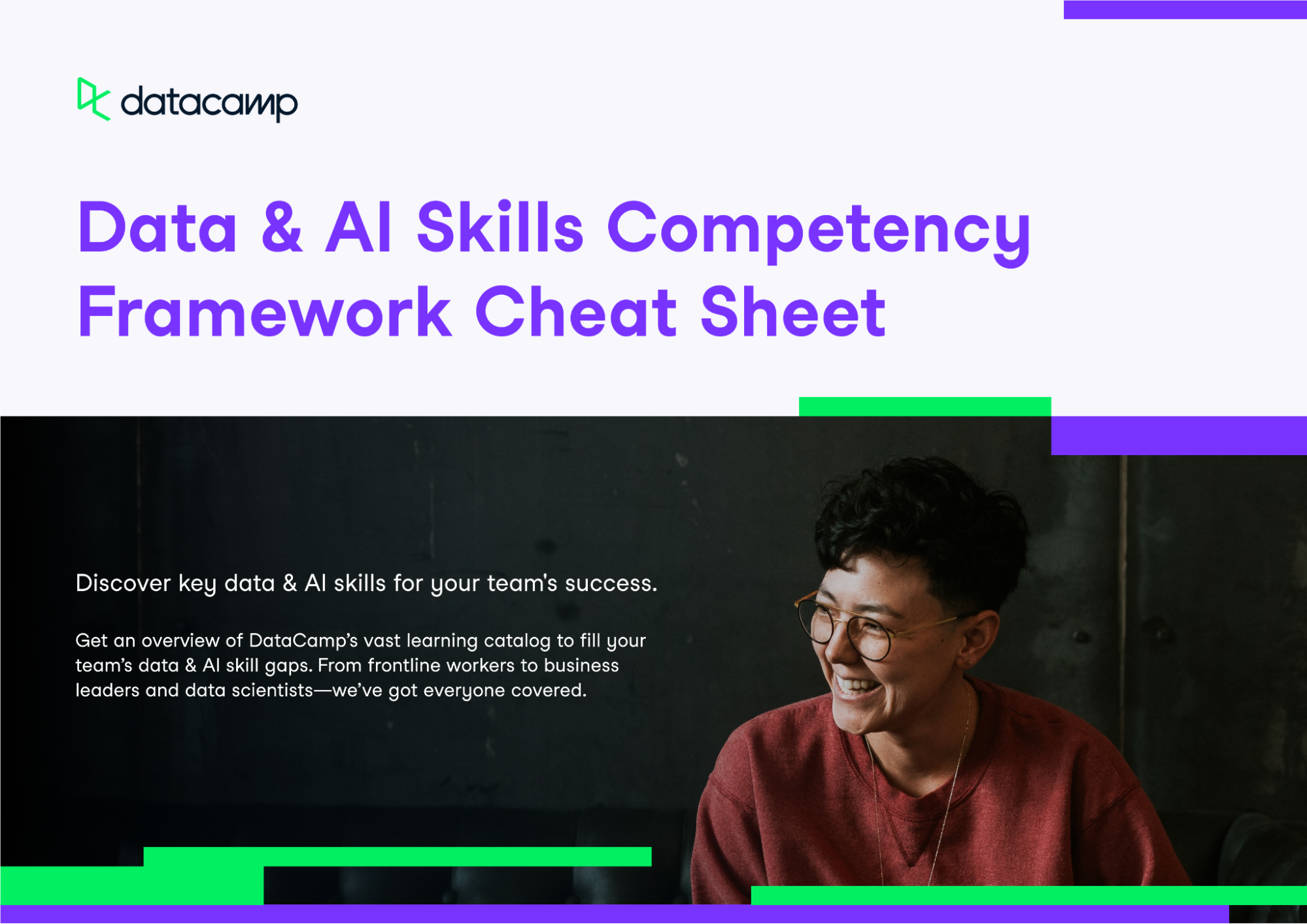The ability to harness the power of data and artificial intelligence (AI) is not just an advantage in the modern world; it's a necessity for organizations aiming to lead in their respective fields. The rapid pace of technological advancement in data analytics and AI demands a workforce that is conversant with these technologies and proficient in leveraging them to drive innovation and strategic decisions.
This inflection point is where a data & AI skills competency framework comes into play, providing a structured approach to identifying, developing, and measuring an organization's data and AI skills. You can learn more about this topic with our Organizational Data Competency webinar.
Empower Your Team with Data Literacy
Enhance your team's data literacy and decision-making capabilities with DataCamp for Business. Access diverse courses, hands-on projects, and centralized insights for teams of 2 or more.

What is a Data & AI Skills Competency Framework?
A data & AI skills competency framework is a comprehensive, structured approach designed to identify, develop, and evaluate the essential skills and competencies required for effective data analysis, management, and AI application within an organization.
It serves as a roadmap for individuals and teams, outlining the specific skills needed at various proficiency levels to ensure that employees are equipped to meet current and future challenges in data and AI fields. This framework helps organizations in strategic workforce planning, talent development, and enhancing their overall data and AI capabilities.
DataCamp’s Data & AI Skills Competency Framework at a Glance
At its core, DataCamp’s data & AI competency framework categorizes skills and competencies into several key domains, each critical to the effective use of data and AI technologies. As we explore in our guide to data literacy, these domains typically include:
Communicating with data & AI
Communicating with data and AI involves effectively interpreting, presenting, and discussing data-driven insights and AI findings with a diverse audience.
This competency includes the skills to create clear and compelling visualizations, articulate complex concepts in an accessible manner, and leverage storytelling to convey the significance of data and AI outcomes.
It's about bridging the gap between technical and non-technical stakeholders, ensuring that data-driven decisions are understood and actionable.
Read with data
Reading with data refers to the capability to understand and interpret data in various forms. It involves the critical analysis of data sources, discerning patterns, trends, and anomalies within datasets, and comprehending the underlying stories that data tells.
Such competency is fundamental for professionals across all levels, enabling them to question the quality and relevance of data, understand the context, and draw preliminary conclusions that guide further exploration.
Reasoning with data & AI
Reasoning with data & AI encompasses the ability to apply logical and analytical thinking to data and AI outputs. This includes formulating hypotheses, conducting experiments, and using statistical methods to validate findings.
It also involves ethical reasoning, considering the broader implications of data and AI applications, and making decisions that align with ethical standards and societal values. This competency is crucial for developing robust data models, interpreting AI predictions, and making informed, ethical decisions based on data.
Working with data & AI
Working with data & AI involves the hands-on skills and technical know-how to manipulate, analyze, and derive insights from data, as well as to develop, deploy, and manage AI systems.
This competency covers a broad spectrum of skills, from data preprocessing and cleaning to advanced machine learning and AI techniques. It also includes working with various tools and technologies, collaborating on data and AI projects, and continuously adapting to new methodologies and innovations in the field.

Unpacking Key Data & AI Skills
Now that we have a broad understanding of the key aspects of a data competency framework, let’s further explore the details of each. This will give us a clearer picture of the proficiencies professionals will need to develop as part of their data and AI training.
Communicating with data & AI
- Data storytelling: The art of effectively communicating insights and findings from data analysis.
- Understanding data science concepts: Being knowledgeable and conversational about the methods, theories, and tools used in the field of data science.
- Understanding data engineering concepts: Being familiar with the processes and technologies involved in designing, constructing, and maintaining data pipelines and infrastructure.
- Understanding machine learning concepts: Being knowledgeable about the possibilities and limitations of machine learning and the techniques used to train and operate predictive models.
- Understanding AI concepts: Being familiar with key AI technologies, such as ChatGPT, Large Language Models, and Generative AI.
- AI applications for business: Understand how to utilize AI and Large Language Models to extract business value from AI.
Read with data
- Interpreting data insights and visualizations: Being able to understand and make sense of data-based findings and their representations.
- Data-driven decision making: Using data and analysis to inform business decisions.
Reasoning with data & AI
- Business analysis: Using data and analysis to understand and improve business processes and operations.
- Statistical analysis: Using statistical methods to analyze and make inferences from data.
- Reporting with data: Presenting data-based findings and insights in a clear and concise manner.
Working with data & AI
- Data wrangling and manipulation: Transforming and organizing data for analysis.
- Predictive modeling and machine learning: Training and using predictive models to make predictions about future events.
- Data engineering: Designing and building the infrastructure and processes for collecting, storing, and analyzing data.
- Programming: Mastery of programming languages to perform data-related tasks.
- Importing and cleaning data: Reading data from various sources and ensuring they are free of data quality issues.
- Data visualization and dashboard design: Creating graphical representations of data and designing interactive dashboards for data exploration and analysis.
- Developing AI systems: Create production-ready AI applications, and build and fine-tune LLMs for specific use cases.
- Responsible AI: Understand the ethical implications of using AI and leverage AI responsibly.
- Working with and steering AI systems: Leverage ChatGPT and other LLMs to automate routine tasks and drive workflow efficiencies.
Data & AI Skills Competency Framework Cheat Sheet & Template
So, we’ve covered the main beats of the data competency framework and included some resources that can help your teams build the necessary skills. To help you get started in a more structured way, we have both a cheat sheet and a template that can help you maximize your efforts.
Data & AI skills competency framework cheat sheet
Given that data and AI skills competencies vary significantly by role, it's essential to tailor your approach to upskilling and development to meet the specific needs of each profile within your organization.
To help you navigate this, we've created a comprehensive cheat sheet that breaks down the key competencies required for various roles involved in data and AI initiatives. You can download the cheat sheet for free!

Download our Data & AI Competencies Cheat Sheet
Data & AI Skills Competency Framework Template
Each organization has its unique set of challenges, goals, and workforce dynamics. A one-size-fits-all approach to developing data and AI competencies may not be effective.
To accommodate different organizations' diverse needs and structures, we have created an editable Data & AI Skills Competency Framework Template for you to download.
Build Your Organization’s Data Skills with DataCamp
A data and AI skills competency framework is an invaluable tool for organizations aiming to navigate the complexities of the digital landscape. By defining the essential competencies and providing a structured approach to skills development, this framework lays the foundation for a data-savvy workforce capable of driving business success.
At DataCamp, we’ve worked with 4,000+ organizations, including Allianz, CBRE, Specsavers, Marks & Spencer, Colgate, Google, and more on their data & AI upskilling programs. Speak to our team to learn more about our programs.
Training 2 or more people? Check out our Business solutions
Get your team access to the full DataCamp library, with centralized reporting, assignments, projects and more

Data Competency Framework FAQs
What are the main benefits of implementing a data & AI skills competency framework in an organization?
Implementing a data & AI skills competency framework helps organizations systematically develop and measure essential skills, leading to improved data literacy, better decision-making, and enhanced innovation. It also aids in strategic workforce planning, ensuring that employees are well-equipped to meet future challenges in data and AI fields.
How can organizations assess their current data and AI competency levels?
Organizations can assess their current competency levels through self-assessment surveys, skills audits, performance reviews, and benchmarking against industry standards. Utilizing tools and platforms like DataCamp can provide detailed insights into the existing skills and identify areas for improvement.
What roles within an organization would benefit most from a data & AI skills competency framework?
Roles across all levels benefit from a data & AI skills competency framework, including data scientists, data engineers, business analysts, IT professionals, and even non-technical roles that require data-driven decision-making. Tailoring the framework to specific roles ensures that each team member develops the relevant skills needed for their position.
What is the difference between data literacy and data competency?
Data literacy refers to the ability to read, understand, and interpret data, whereas data competency encompasses a broader set of skills, including data manipulation, analysis, visualization, and the ability to apply data insights to solve problems and make decisions. A data competency framework covers both data literacy and the technical skills required for effective data and AI work.
Can small and medium-sized enterprises (SMEs) benefit from a data & AI skills competency framework?
Yes, SMEs can significantly benefit from implementing a data & AI skills competency framework. It helps streamline their data operations, make informed decisions, and stay competitive by leveraging data and AI technologies effectively. Customized frameworks can address the specific needs and constraints of SMEs.

Adel is a Data Science educator, speaker, and VP of Media at DataCamp. Adel has released various courses and live training on data analysis, machine learning, and data engineering. He is passionate about spreading data skills and data literacy throughout organizations and the intersection of technology and society. He has an MSc in Data Science and Business Analytics. In his free time, you can find him hanging out with his cat Louis.




